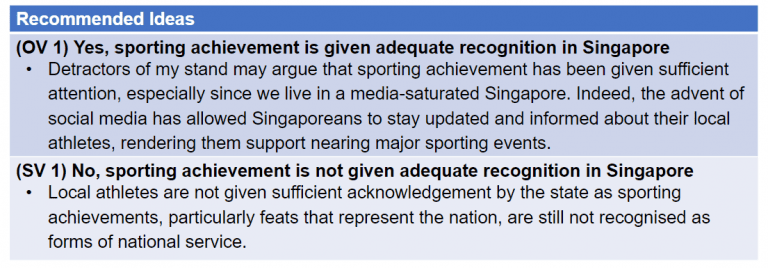Question Analysis:
Possible Ideas:
Legend:
SV = Supporting Viewpoint
OV = Opposing Viewpoint

Sample Paragraphs:
(OV 1)
Detractors of my stand may argue that sporting achievement has been given sufficient attention, especially since we live in a media-saturated Singapore. Indeed, I acknowledge the fact that the advent of social media has allowed Singaporeans to stay updated and informed about their local athletes, rendering them support nearing major sporting events. For example, local athletes such as badminton player, Loh Kean Yew, and swimmer, Joseph Schooling have social media accounts that have amassed a huge following. Indeed, they are well-known for their skills and talent in their respective fields. When major sporting events such as the SEA Games at Hanoi, Vietnam in 2022 were fast approaching, many sent well-wishes before the games and congratulatory messages after the athletes achieved wins. Such an example demonstrates that because of the interconnectivity that the internet brings, Singaporeans are more aware of their athletes and their accomplishments. The online presence of these young athletes also makes it easier for the average Singaporean to live vicariously through their sporting journey. Without the easy accessibility of social media platforms, there would not be such attention showered on our local athletes. Therefore, whilst I opine that more recognition can be given, I acknowledge that because of social media, local athletes' accomplishments are more widely known by Singaporeans.
(Transition Statement + SV 1)
Despite the high social media following, I argue that local athletes are not given sufficient acknowledgement by the state as sporting achievements, particularly feats that represent the nation, are still not recognised as forms of national service. National service essentially means service to the state and national athletes should be given recognition for their dedication to the sport and their successful representation of the country in a field that not many have the ability to venture far. To further put things into perspective, in countries like South Korea, male athletes are exempted from national service once they have achieved a win at a major sporting event. They will only complete four weeks of basic military training upon the condition that they continue their careers for approximately three years. After which, they will only need to return for a few days of military training every year for six years. In contrast, Singapore offers no exemptions and only deferments for local athletes even when they have constantly been performing well. Joseph Schooling, in particular, won Singapore's only gold medal at the Rio Olympics in 2016 and was only granted a deferment. Whilst it can be argued under the guise of "fairness" where all Singaporean males should receive the same treatment, I argue that this is a poor gauge of what defines as 'fairness', especially since athletes are not the average Singaporean male. Thus, if sporting achievement were to be truly recognised in my country, it would be noteworthy to consider conditional exemptions for individuals who have brought pride and glory for the country. Until such efforts are being made, I argue that there is inadequate recognition given to Singaporean athletes.
Links for Reference: